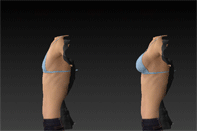Breast implants can be a life-changing choice for many women, boosting self-esteem and helping them feel comfortable in their own skin. While breast augmentation surgery is a popular and minimally invasive procedure with a fast recovery time, some post-operative side effects may occur. One of the most common side effects reported by women after breast implant surgery is increased breast sensitivity. In this article, we’ll explore why breast sensitivity changes can occur, their potential causes, and how to find relief.
Can Breast Implants Increase Sensitivity?
If you’ve noticed increased sensitivity in your breasts after getting breast implants, you’re not alone. This phenomenon is known as hypersthesia or neuropathic pain, and it often occurs as a temporary side effect of breast augmentation surgery.
During the procedure, skin and nerves are stretched to accommodate the implant. The extent to which you experience hypersthesia depends on various factors, including the increase in breast size. Significant increases in size may heighten the likelihood of nerve-related discomfort.
Hypersthesia typically occurs after the initial recovery period, usually about 3 weeks to 9 months post-surgery. This sensation is mostly caused by temporary changes to the nerves in your breasts. The myelin, or “insulation,” surrounding these nerves is affected during surgery, which can lead to tenderness and heightened sensitivity. This discomfort typically subsides as the body repairs the myelin and restores normal nerve function.
Will I Lose Sensitivity in My Breasts After Implants?
Breast implant surgery can occasionally lead to a decrease in nipple sensitivity, and for some individuals, this change can be concerning. While heightened sensitivity in the breasts is a common side effect in the initial post-operative period, a decrease in nipple sensitivity is less common but can occur. Here are some factors that might contribute to this phenomenon and what you can do if you experience it:
- Surgical Technique: The surgical approach and technique used during breast augmentation can impact nipple sensitivity. If the nerves supplying the nipples are inadvertently affected during surgery, it may lead to decreased sensitivity.
- Implant Placement: The placement of breast implants can also influence nipple sensitivity. Implants positioned under the chest muscle (submuscular) may exert more pressure on the surrounding nerves and potentially affect nipple sensation.
- Individual Variability: Every person’s body responds uniquely to breast augmentation. Some individuals may experience decreased nipple sensitivity, while others may not.
- Temporary Sensation: It’s crucial to understand that decreased nipple sensitivity might be a temporary issue that resolves as the body adjusts to the presence of breast implants. Nerves can take time to heal and adapt to the changes.
If you’re experiencing decreased nipple sensitivity and find it bothersome, it’s essential to communicate with your plastic surgeon. They can provide guidance and assess your specific situation to determine the best course of action. In some cases, the issue may resolve on its own over time. For others, additional procedures or interventions might be considered to improve sensation.
Remember that every individual’s experience with breast implant surgery is unique, and while changes in nipple sensitivity can occur, they are not typically permanent.
Why Do My Breast Implants Hurt Years Later?
Many women wonder if breast sensitivity changes can persist years after breast implant surgery. While sensitivity issues are most common shortly after surgery, some individuals may experience ongoing discomfort. Factors that can contribute to discomfort years later include:
- Implant Size: Larger implants may place more stress on the nerves, potentially leading to prolonged sensitivity changes.
- Scar Tissue: The formation of scar tissue around the implant can also affect sensitivity.
Managing Breast Sensitivity After Breast Implants
Breast sensitivity changes after breast implant surgery are common and usually temporary. However, it’s essential to know how to manage and address these sensations, whether you want to increase or decrease breast sensitivity.
Increasing Sensitivity
If you’re looking to enhance the sensitivity of your breasts after breast implant surgery, there are a few techniques to consider:
- Breast Massage: Gently massaging your breasts can stimulate blood flow and nerve endings, potentially increasing sensitivity over time. It’s essential to do this with care, using recommended techniques to avoid discomfort.
- Sensory Stimulation: Experiment with various forms of sensory stimulation, such as temperature play or textured fabrics. These experiences can help reawaken dormant nerve endings and heighten sensitivity.
- Kegel Exercises: Some women find that Kegel exercises, which involve contracting and relaxing the pelvic floor muscles, can indirectly contribute to increased breast sensitivity. The theory is that improved circulation in the pelvic area may have a positive impact on breast sensation.
Decreasing Sensitivity
If heightened sensitivity is causing discomfort and you’d like to decrease it, consider the following methods:
- Medication: Over-the-counter pain relievers like Ibuprofen (Advil) can help reduce discomfort and tenderness. Always consult with your surgeon or healthcare provider before taking any medication to ensure it’s safe for your specific situation.
- Nipple Protection: To minimize friction and contact with clothing, you can use nipple protectors, gauze pads, or large band-aids. This can help reduce sensations that exacerbate breast sensitivity.
- Cool Compress: Applying a cool compress to the breasts can offer temporary relief from heightened sensitivity. Be sure to use a clean cloth or cooling gel pad to avoid any infection risk.
Remember, it’s essential to communicate with your surgeon or healthcare provider if you’re concerned about changes in breast sensitivity. They can provide personalized guidance based on your specific situation and needs. Whether you aim to increase or decrease sensitivity, managing your comfort and well-being is a crucial part of your breast implant journey.
Breast Implants and Nipple Sensitivity
Breast augmentation can have a profoundly positive impact on a woman’s self-esteem and confidence. While numbness, tenderness, or sensitivity are common side effects, they typically resolve over time and can be easily managed.
Modern surgical techniques, like Dr. Adams’, aim to minimize post-operative side effects and ensure a fast and comfortable recovery. If you’re considering breast augmentation or have any concerns about breast sensitivity, reach out to us to learn more about our advanced procedures and 24-hour recovery options.
















